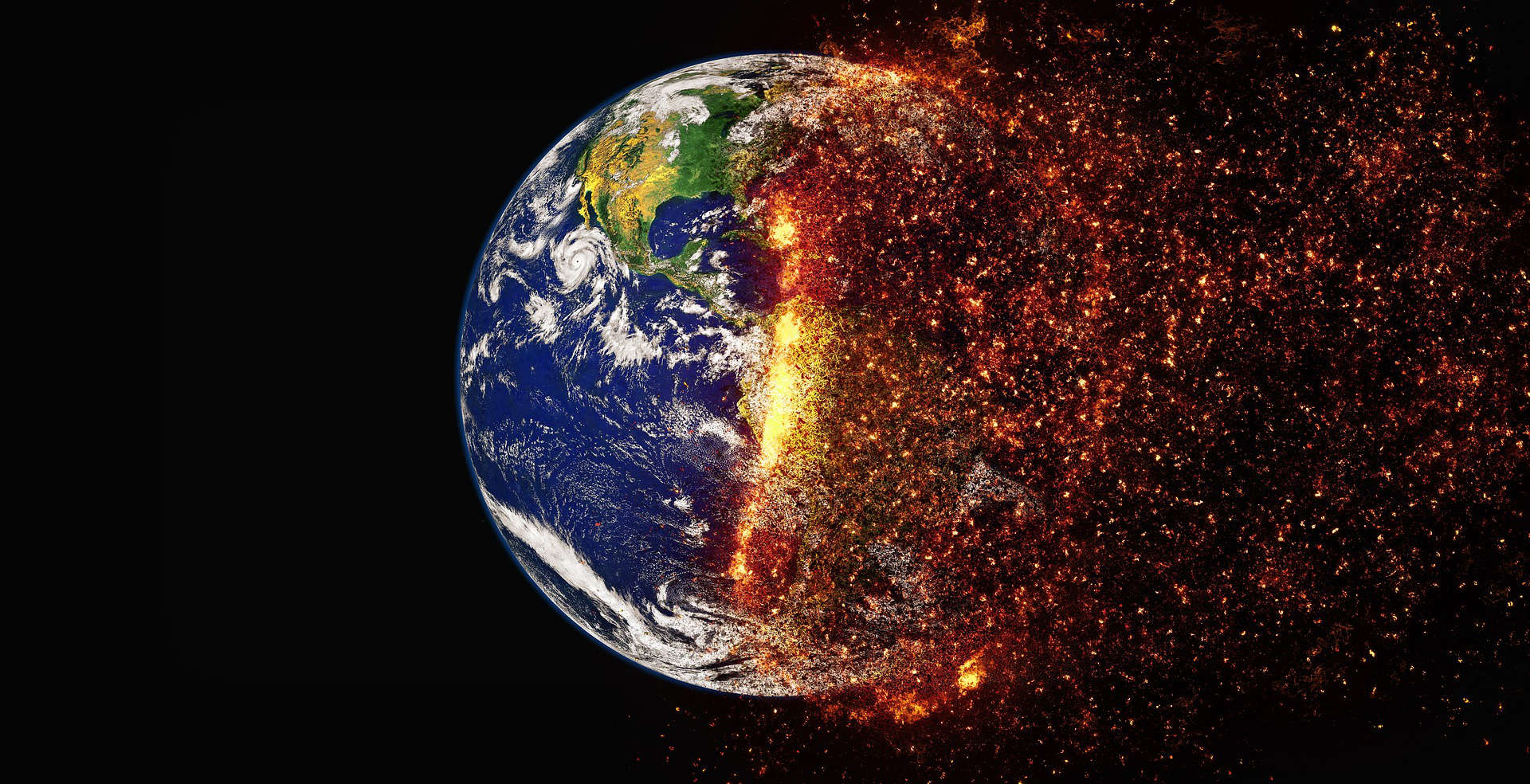After this year’s global heatwave, bringing with it devastating wildfires, extreme floods, and thousands of deaths, can anyone still deny climate change?
In the UK, flights were suspended after a runway melted, and green places dried to a crisp. China reported its longest drought ever – a record 70 days straight – drying up rivers, ruining crops, and sparking forest fires. Receding water levels in Spain revealed ancient archeological sites that have been submerged since the 1960s.
In Texas, dinosaur tracks appeared on a dried-up riverbed, while Utah and Oklahoma saw record-breaking consecutive days in which the temperature soared above 100°F (38°C), putting millions of people at risk from the heat.
This is not an anomaly – global climate crises are getting worse. The 2018 National Climate Assessment found that heatwaves had tripled in the US since the 1960s, and their length had increased by 45 days. The rest of the planet is following that trend, according to the United Nations’ Intergovernmental Panel on Climate Change.
What world are we creating for future generations? This summer has been Earth’s wake-up call – and it’s time to claim responsibility for the way we live and work, to create a better, more sustainable future.
My daughter asked me the other day: “Mama, can the trees speak to us?” I said I wish they could, but no they can’t. “I think they do, Mama,” she said. “They’re telling me they are so sad. They are trying to connect to our hearts with their fluttering of the leaves. They are trying to tell us they need us to help them so much more because, if we don’t, they’ll die.”
What incredible inner knowledge and insight from an 11-year-old! It brought me to tears. “Why are you crying, Mama?” she asked. “Because you’re right,” I said.
I’ve only just started my personal climate change journey. Every day, I learn something new about how I can help reduce carbon emissions and water wastage. It’s not a one-size-fits-all solution, but my vision is that, if everyone in the world takes one tiny step to help the environment, we can and will create change.
In June 2021, the World Economic Forum announced that there had been an increase – not a decrease – in global CO2 emissions. Fifteen million people die every year because of the quality of the air in the world. I don’t want that to be you. I don’t want that to be me. We have to start treating this as the emergency it is – for ourselves and for future generations.
I’ve managed to rewire my own neural pathways in the last few months and it has had profound effects – giving me intuitive insights about the future of our planet. I believe we can all tap into the deeper knowledge that is inside us – our inner genius – to change the way we work. But we need to take a step back and slow down.
So close your eyes, take a deep breath, and visualize the natural world in the future. What does it look like? How are we taking care of it? How does that compare to what we do in the present? Got it? Keep that in mind. Because I want to share my own vision for the future of our planet. It’s probably one of the most important things I have ever written.
To all the people living in 2023,
That year felt, for many, like things had gone back to normal. Of course, there were issues such as the war in Ukraine, economic instability, and rising costs of energy. And there was a general concern about the environment and many new sustainability companies were launched. But nobody really understood the severity of what we had done to the planet until a huge climatic disaster hit. Then another one. Extreme heat caused people to flee their countries, and flooding saw whole islands disappear. A toxic dust caused by pollution resulted in even more deaths. It became clear that we would have to wear masks whenever we went outside, to protect us from the microplastics in the atmosphere.
The same systems we used in our way or working were the same systems and procedures that were killing the Earth … and the Earth was fighting back. It was time to take radical, international action before 2030. Every single man, woman and child’s focus was to save our Earth … and our lives.
Here in the future, countries and nations have come together for the sake of the environment, and the health and wellbeing of our people, animals and wildlife. Every single decision we make is based on how it will affect the planet. Wars have stopped and we have visionary leaders and governments that collaborate peacefully. Large countries help small ones, and investors and businesses contribute their wealth.
Countries and businesses are kept accountable for any changes they make, and are fined on an international level if they don’t take action on the UN’s sustainable development goals (which have become the 5 Global Environment Laws). The UN itself has been simplified and restructured to focus on the environment. The World Health Organization implements global guidelines around wellbeing and burnout that all businesses and governments are held accountable for. The World Environment Government has been created as a force for good.
We have managed to save some of our greatest animals that were threatened by extinction. We have been able to save Antarctica from disappearing completely.
We now live and work in sustainable pods, breathing fresh air, and drinking clean, filtered water that is protected from micropastics and dust. We use solar panels, wind turbines, and renewable geothermal energy, and have managed to stop using fossil fuels entirely. Our buildings are filled with natural light and plants, and we’ve created specific habitats to enhance the development of nature.
We’ve learned to change the way we work, and stress and burnout are at a minimum. We’ve rewired our neural pathways to accept and deal with climatic uncertainty. We don’t come together in person all the time, but on specific days that we decide on together – because we now work in flat organisations. Business travel has been cut, and companies are fined if they allow it, so we travel less.
Here In the future, we align the ethics of our work and its purpose with the world’s needs and problems – and it has increased productivity and happiness. Our employees are peaceful and have no fear. We measure burnout with a scientifically backed method, and commit to continually reducing the risk. Preventing poor physical and mental health is at the heart of everything we do. We have cleaned up our supply chains and wellbeing is enshrined as part of our job descriptions and companies’ mission and purpose.
We never take nature for granted. We have learned to work and live differently and we are more peaceful and calm as a result. We have become known as the greatest discoverers and innovators of our time. We have even discovered parts of the ocean and animals we didn’t know existed. Through technology we’ve learned to read and connect with nature and predict future climatic change. Nature, animals and humans live in peace with each other and respect each other.
We have learned to become resilient and adapt, saving millions of lives in the process, and reversing many of the effects of climate change.
Dear people – there is hope, the future is bright. So bright! But you need to start taking action now. This is called active hope. Get ready for change and make sure the new businesses and new habits you create are healthy ones. Take care of yourselves and your companies so you can take care of the planet.
Best wishes,
Your future world and it’s wonderful human beings
I’d like to invite you to tap into your own inner genius. It is obvious that the past has not given us what we need. It is obvious we need to change. And for that, we need the deeper knowledge we all have. We NEED to tap into our letters from the future – the future or work, of the planet, the future of collaboration, of energy supply. We can then download this information and use it to create our new world.
BONUS CONTENT
Three things you can do RIGHT NOW that will save energy, protect the planet, and make you healthier
Are you angry about energy prices going up? It’s an understandable human reaction. But what if we switched our perception of the changes that have been forced upon us, and considered the positive side instead? This is how we’ll mentally prepare for the next energy crisis. Instead of responding with anger and judgment, here are 3 things you can do RIGHT NOW that will be good for our wellbeing, our bank balance AND our planet.
1. Turn off the lights when you don’t need them
Switching off the lights, even when you leave a room for a few minutes, has been proven to save energy AND save money (how much depends on the type of bulb you use and your specific tariff). Go one step further and start turning everything off at 10pm and have an early night (who needs a blackout when we can take control of this ourselves?). You’ll sleep better, have increased energy levels, improved memory, a better mood, less stress and a stronger immune system. A regular early night can even help control body weight. Creating these small habits over time will make a significant impact on carbon emissions and your own health.
2. Use less water
Take shorter showers, fewer baths, and turn off the tap when you brush your teeth. In my family, we even turn off the water while we’re soaping up, then turn it back on to rinse. I then have a one-minute cold shower at the end (research has shown that this can strengthen your immune system and make you more resistant to illness. One study even connected cold showers to improved cancer survival). These steps could save you more than $1,000 a year and conserve the environment.
3. Save fuel
Make sure your tyre pressure is correct and that you’re driving in the right gear (the RAC recommends the highest possible gear while keeping within the speed limit). Take off the roof rack if you’re not using it and generally reduce the weight in the car (even driving with the window down can impact your fuel use). Plan your route to avoid unnecessary mileage. Even better, leave the car at home and start taking public transportation, biking, or walking whenever possible. Transportation is the largest source of carbon emissions in the US – you have the power to change that.



